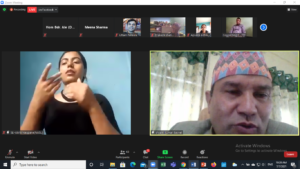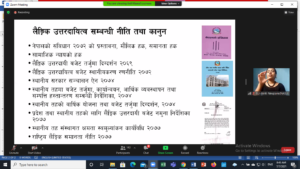The role of civil society in the gender responsive budget process of Local and Provincial Government


The concept of inclusion enshrined in Nepal’s constitution and law must be addressed through government policies, programs and budgets and implemented accordingly. At present, all three levels of government have made public their annual policies and programs, including the budget.
The federal government has made public its policies and programs through ordinances, while the state governments have made them public through their assemblies. Many local governments have already passed the annual policy and program meeting.
In this regard, the partners of Mutual Accountability Local Initiative working in Bagmati Province have organized a virtual interaction program on the role of civil society in the inclusive budget promotion of local and state governments on 7 July, 2021.
Objective of the Program
- To analyze the annual policies and programs made public by Bagmati Pradesh and local government from the perspective of gender equality and social inclusion.
- To motivate the local and state governments to formulate an action plan with an inclusive approach while implementing the language policy program.
Activities Details
Two working papers were presented in the program. The first presenter of the event was GESI and GRV Expert Ms. Kusum Bist. In her presentation, she analyzed the province level GESI Responsive Budget of FY 2078/79 of Bagmati Province. In the presentation, she presented the strengths, gap and the reforms that need to be made for the effective policy, program and budget. She also pointed out areas to be improved in the coming days.
Mentioning the gap in the program, she highlighted that many aspects covered by the policy and programs were not covered by the budget and the aspects included in the budget were not covered by the policy and program.
Suggestions were made to take initiative for formulation of GESI policy at the province and subordinate bodies and at the local level, to set goals while implementing the program and budget, to take suggestions from women and target groups in the policy process, to study and analyze the situation and need of target group before finalizing the budget and program.
She also added that, civil society organizations are playing effective role in budget process and GESI mainstreaming.
At the end of the program, she pulled the attention of Minister Mrs. Saraswati Basnet to focus on raising capacity/skill enhancement, empowerment program rather than infrastructure development program to target group.
Another working paper was presented on behalf of the entire civil society organization working in Bagmati province. The paper was presented by Mr. Anil Kumar khanal. In the presentation, the assistance provided by the civil society organization to the local government in policy formulation, implementation to monitoring in GESI Mainstreaming’s were highlighted. The presentation suggested the need of GESI Responsive budget guideline, accessible information dissemination mechanism, development of monitoring and evaluation system and adoption of policy to end GESI budget transfer to other programs.
National Inclusion Commission honorable member Ms. Bishnu Maya Ojha speaking in the event said that, an inclusive budget based on social justice is needed. There is need for a policy program to mainstream not only the target group but also the backward class within the target group, she said.
Social Development Minister Saraswoti Basnet, expressed her commitment to take immediate action in formulating policy to implement the program on time. Addressing the issue of lack of budget allocation even though the program was not mentioned as per the policy. She expressed her commitment to carry out the program at any cost. Mentioning the gaps in the program, she said, ministry will focus on the skill based program of 3 months or more rather than development activities on the name of the target groups. The Ministry is working on the field of gender equality. Budgets have been allocated locally for school nurses, FCHV volunteer mobilization, child marriage reduction and end programs but we are still facing the problem in affective program and budget implementation. She added, we received so many feedbacks and suggestions from the program and we will interact with civil society organizations and other stakeholders in policy, guideline development process.
Shyam Kumar Basnet, Vice chair of policy and planning commission, highlighted that the working paper covered the policy, good aspects, gaps and suggestions which drag the attention of policy and planning commission. He said that thinking is more important than budget program and the government has not been able to pay enough attention to policies, procedures and programs.
As federalism is a new practice, we are focused on learning and institutionalizing the structure where Citizen Participation has not been given much attention in policy formulation, program prioritization and civil society organizations have helped a lot in bringing this issue forward. He said that the government was considering the problems, lacking in the budget and the event had given direction and way forward. In the end, he noted that despite the good policies and programs, poor implementation and monitoring, civil society needs to be facilitated and vigilant in the policy process, and the government needs to address them.
There were more than 166 participants participated in the event from various ministries, parliament, Local government, Civil society, NGO Federation and different civil society forums. The event was facilitated by Meena Sharma , chairperson from IHRICON.
